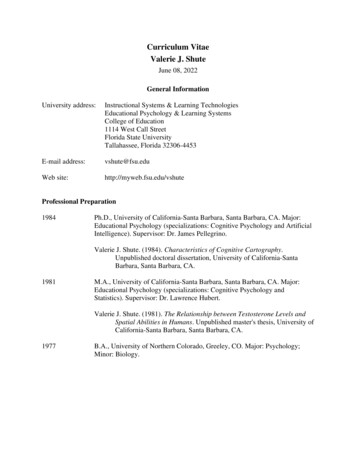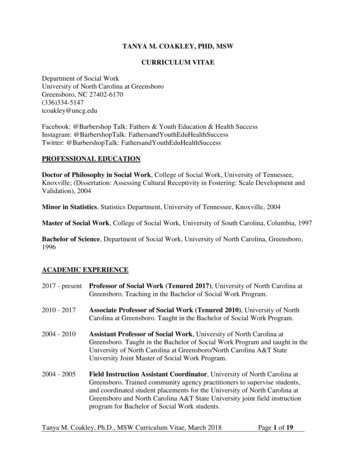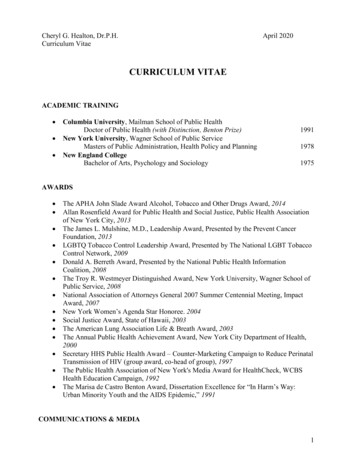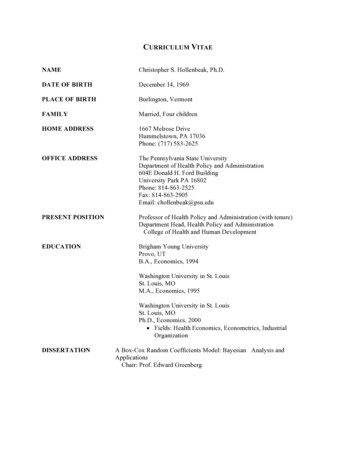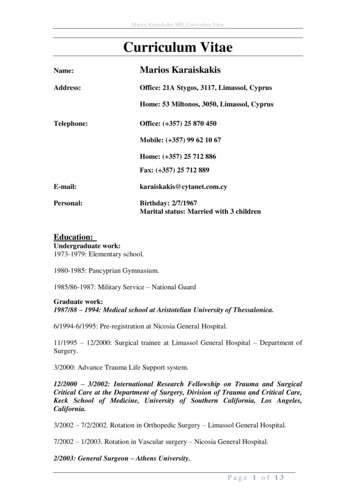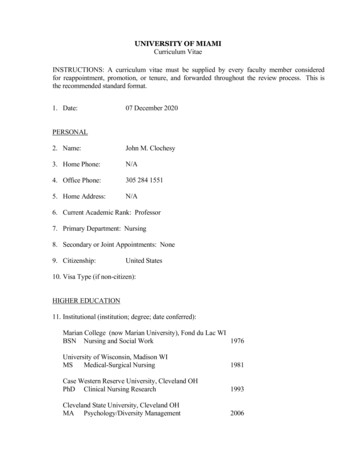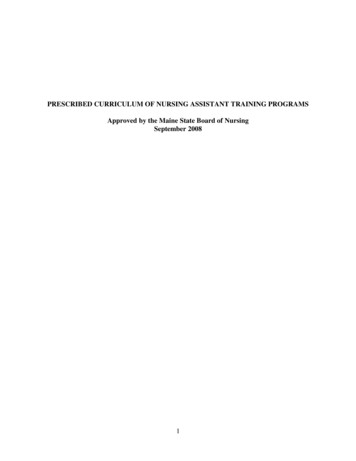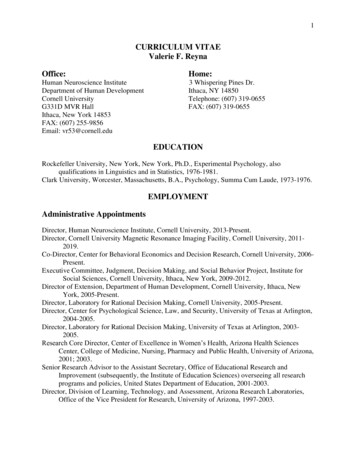
Transcription
1CURRICULUM VITAEValerie F. ReynaOffice:Home:Human Neuroscience InstituteDepartment of Human DevelopmentCornell UniversityG331D MVR HallIthaca, New York 14853FAX: (607) 255-9856Email: vr53@cornell.edu3 Whispering Pines Dr.Ithaca, NY 14850Telephone: (607) 319-0655FAX: (607) 319-0655EDUCATIONRockefeller University, New York, New York, Ph.D., Experimental Psychology, alsoqualifications in Linguistics and in Statistics, 1976-1981.Clark University, Worcester, Massachusetts, B.A., Psychology, Summa Cum Laude, 1973-1976.EMPLOYMENTAdministrative AppointmentsDirector, Human Neuroscience Institute, Cornell University, 2013-Present.Director, Cornell University Magnetic Resonance Imaging Facility, Cornell University, 20112019.Co-Director, Center for Behavioral Economics and Decision Research, Cornell University, 2006Present.Executive Committee, Judgment, Decision Making, and Social Behavior Project, Institute forSocial Sciences, Cornell University, Ithaca, New York, 2009-2012.Director of Extension, Department of Human Development, Cornell University, Ithaca, NewYork, 2005-Present.Director, Laboratory for Rational Decision Making, Cornell University, 2005-Present.Director, Center for Psychological Science, Law, and Security, University of Texas at Arlington,2004-2005.Director, Laboratory for Rational Decision Making, University of Texas at Arlington, 20032005.Research Core Director, Center of Excellence in Women’s Health, Arizona Health SciencesCenter, College of Medicine, Nursing, Pharmacy and Public Health, University of Arizona,2001; 2003.Senior Research Advisor to the Assistant Secretary, Office of Educational Research andImprovement (subsequently, the Institute of Education Sciences) overseeing all researchprograms and policies, United States Department of Education, 2001-2003.Director, Division of Learning, Technology, and Assessment, Arizona Research Laboratories,Office of the Vice President for Research, University of Arizona, 1997-2003.
2Director, Informatics and Decision Making Laboratory, College of Medicine, University ofArizona, 1996-2003.Director, Biopsychosocial Core, National Institutes of Health Center, Department of Pediatrics,University of Arizona, 1998-2001.Faculty AppointmentsProfessor, Department of Healthcare Policy and Research (Public Health), Division ofComparative Effectiveness and Outcomes Research, Weill Cornell Medical College, NewYork City, New York, 2011-Present.Professor, Department of Human Development, Department of Psychology, Cognitive ScienceProgram, Neuroscience Program, and Center for Behavioral Economics and DecisionResearch, Cornell University, Ithaca, New York, 2005-Present.Faculty Affiliate, Bronfenbrenner Center for Translational Research, Cornell University, Ithaca,New York, 2012-Present.Faculty Affiliate, Cornell Population Program, Cornell University, Ithaca, New York, 2007Present.Professor, Department of Psychology, University of Texas at Arlington, Arlington, Texas, 20032005.Member, Institute for Research in Security, Department of Computer Science and Engineering,University of Texas at Arlington, Arlington, Texas, 2003-2005.Professor, Department of Biomedical Engineering, University of Texas at Arlington, Arlington,Texas, 2004-2005.Professor, Arizona Cancer Center, University of Arizona, Tucson, Arizona, 2002-Present.Professor, College of Public Health, Division of Health Promotion Sciences, University ofArizona, Tucson, Arizona, 2001-2003.Professor, Department of Surgery, Medicine, Biomedical Engineering, Mexican-AmericanStudies, and Women’s Studies, University of Arizona, Tucson, Arizona, 2000-2003.Professor, Department of Pediatrics, College of Medicine, University of Arizona, Tucson,Arizona, 1998-2001.Professor, Telemedicine Program, College of Medicine, University of Arizona, Tucson, Arizona,1996-2003.Associate Professor, Department of Surgery and in Medicine, University of Arizona, Tucson,Arizona, 1996-2000.Associate Professor, Department of Mexican-American Studies, University of Arizona, Tucson,Arizona, 1999-2000.Associate Professor, Biomedical Engineering Program, University of Arizona, Tucson, Arizona,Associate, 1997-2000.Associate Professor, Department of Women’s Studies, University of Arizona, Tucson, Arizona,1994-2000.Associate Professor, Department of Educational Psychology, University of Arizona, Tucson,Arizona, 1992-1996.Assistant Professor, Department of Educational Psychology, University of Arizona, Tucson,Arizona, 1989-1992.Adjunct Assistant Professor, Department of Educational Psychology, University of Arizona,Tucson, Arizona, 1988-1989.
3Adjunct Research Associate, Department of Management and Policy, University of Arizona,Tucson, Arizona, Decision Behavior Group, 1987-1988.Assistant Professor, Department of Psychology, University of Texas at Dallas, Richardson,Texas, 1981-1987.Visiting Scholar, Department of Psychology, Stanford University, Stanford, California, 19821983.Postdoctoral Fellow, Language and Cognition, Educational Testing Service, Princeton, NewJersey, 1980-1981.FELLOWSHIPS IN LEARNED SOCIETIESAmerican Association for the Advancement of ScienceAmerican Psychological AssociationDivision 3-Experimental PsychologyDivision 7-Developmental PsychologyDivision 15-Educational PsychologyDivision 38-Health PsychologyAmerican Psychological Society/Association for Psychological ScienceMEMBERSHIPS IN LEARNED SOCIETIESAmerican Association for the Advancement of ScienceAmerican Psychological AssociationAmerican Psychological Society, Charter fellowFlux: The Society for Developmental Cognitive Neuroscience, MemberJudgment and Decision Making Society, Charter memberPsychonomic Society, Full MemberSigma Xi, Full memberSociety for Medical Decision MakingSociety for NeuroeconomicsSociety for Research in Child DevelopmentHONORS AND DISTINCTIONSAppointed to National/International Boards and Committees (see section below)Research reported in the local, national, and international media (see section below)Signatory expert to a U.S. Supreme Court amicus curiae brief in relation to forensic psychologyand decision-making in legal contexts, 2020.Selected reviewer, Rapid Expert Consultation to outline strategies to increase participation inCOVID-19 contact tracing; National Academies of Sciences, Engineering, and Medicine,2020.Invited symposium moderator, “Responding to COVID-19: Emerging insights from social,behavioral and economic sciences,” National Academies of Sciences, Engineering, andMedicine, October 9, 2020.Invited speaker and symposium moderator, 41st Annual Meeting of the Society for MedicalDecision Making, Portland, OR, October 21-22, 2019.
4Invited discussant, Launch event for the report “A decadal survey of the social and behavioralsciences: A research agenda for advancing intelligence analysis,” National Academies ofSciences, September 30, 2019.Appointed to the Committee of Visitors for the National Science Foundation’s Division ofBehavioral and Cognitive Sciences, which assess the quality and integrity of programoperations in recent years, as well as providing direction and insight on new opportunitiesfor advancing science and the Division of Behavioral and Cognitive Sciences’ role insupporting those endeavors.Invited speaker, “Communicating the gist: Misinformation, memory, and meaning,” Arthur M.Sackler Colloquium Advancing the science and practice of science communication:Misinformation about science in the public sphere, National Academy of Sciences, April3, 2019.Invited presentation, “Giving information simply & transparently (GIST): Applying fuzzy-tracetheory to reduce medical misunderstanding,” Cornell University Board of TrusteesCommittee on Academic Affairs, January 31, 2019.Appointed Chair, Board on Behavioral, Cognitive, and Sensory Sciences Review Committee,Division of Behavioral and Social Sciences and Education, National Academies ofSciences, 2018-2019.Invited keynote speaker, 7th Annual Consumer Neuroscience Satellite Symposium, Society ofNeuroeconomics, Philadelphia, PA, October 4, 2018.Invited keynote address, 3rd Research in Behavioral Finance Conference, “Are irrational biasessmart? A fuzzy-trace theory of risky decision making,” Vrije University Amsterdam,Amsterdam, the Netherlands, September 21, 2018.Invited panelist, 2018 International Bar Association Annual Litigation Forum, “The science ofadvocacy and persuasion – social science perspectives on what works and what doesn’twork,” May 17, 2018.Selected to receive the 2017 Career Achievement Award, the highest award given by the Societyfor Medical Decision Making recognizing sustained distinguished scholarly contributionsto the field.Awarded the Lois and Melvin Tukman Professorship, a permanent endowed chair in the Collegeof Human Ecology, Cornell University, 2016-present.Appointed to the Steering Committee, National Security Decadal Summit of the Board onBehavior, Cognition, and Sensory Sciences and the Social and Behavioral Sciences,which set the research agenda for the behavioral and social sciences and national security,National Academy of Sciences, 2016-2017.Invited speaker, National Academy of Sciences, Science and Entertainment Writers’ Retreat,among a handful of top scientists from different disciplines selected to present theirresearch to screenwriters to foster communicating a realistic picture of science andscientists to members of the public, September 5-7, 2016.Appointed to the Committee on Pain Management and Regulatory Strategies to AddressPrescription Opioid Abuse of the Health and Medicine Division of the NationalAcademies of Sciences, Engineering, and Medicine, which will develop a reportinforming the U.S. Food and Drug Administration (FDA) as to the state of the scienceregarding prescription opioid abuse and misuse, including prevention, National Academyof Sciences, 2016-2017.
5Invited plenary session speaker and panelist, 2017 Annual Meeting of the National Academy ofMedicine, “Developmental Neuroscience: Do We Know Enough to Prevent or ReverseMajor Behavioral Disorders?” October 16, 2017. (Reported on my research and otherson the development of the adolescent brain, including vulnerabilities and opportunities toavoid addiction and make healthy life choices.)Invited keynote speaker, 26th Biennial Subjective Probability, Utility, and Decision Makingconference, Israel Institute of Technology, Haifa, Israel, August 20-24, 2017.Invited keynote speaker, Cross Program Conference, University of Illinois at Chicago, Chicago,IL, March 31, 2017.Invited address, Cognitive Sciences Institute on Reasoning, “A Fuzzy Trace Theory of RiskyDecision Making: Why Reasoning is More like Poetry than Logic,” University ofQuebec, Montreal, Quebec, Canada, June 21, 2016.Invited speaker, 64th Annual Nebraska Symposium on Motivation, “Impulsivity: How Time andRisk Influence Decision Making,” University of Nebraska, Lincoln, NE, April 21-22,2016.Elected a member of the National Academy of Medicine, National Academy of Sciences, 2015.Elected a Fellow of the Society of Experimental Psychologists, the oldest and most prestigioushonorary society in experimental psychology, 2014.Appointed a member of the Council of Representatives of the Federation of Associations inBehavioral & Brain Sciences (FABBS), 2014-present.Appointed to the National Academy of Sciences; Economic Decision Making in AgingPopulations Committee (expert panel), 2013-2014.Appointed Network Scholar of the MacArthur Foundation Research Network on Law andNeuroscience, 2013-2016.Appointed to the Advisory (steering) Committee, National Research Council’s Division ofBehavioral and Social Sciences and Education which oversees 10 boards and standingcommittees, National Academy of Sciences, 2015-2018.Recipient of the SUNY Chancellor’s Award for Excellence in Scholarship and CreativeActivities (a statewide award in recognition of excellence in research), April 18, 2012.Invited speaker, A Fuzzy-Trace Theory of Risky Decision Making Across the Lifespan, Universityof Memphis, Memphis, TN, February 11, 2015.Appointed to the Internal Advisory Committee of the Translational Research Center on Pain inLater Life (TRIPLL), Cornell University’s Edward R. Roybal Center (1 of 12 NationalInstitutes of Health Centers on Aging), 2014-2023.Invited keynote speaker, 53rd Edwards Bayesian Research Conference, Ward Edwards MemorialLecture, Fullerton, CA, March 13-14, 2015.Invited inaugural speaker for a new speaker series at the Max Planck Institute focusing on thecross section of life-span development and decision-making, Risky Decision MakingAcross the Lifespan: A Fuzzy-Trace Theory Approach. Max Planck Institute for HumanDevelopment, Berlin, Germany, December 4, 2014.Invited speaker, A Fuzzy-Trace Theory of Medical Decision Making, Xerox Research Center,Webster, NY, October 23, 2014.Invited speaker, National Academies of Science, Empowering the Miner: Gaps and Needs—AMeeting of Experts, National Research Council, Irvine, CA, February 19-20, 2014.Invited keynote speaker, 52nd Edwards Bayesian Research Conference, Ward Edwards MemorialLecture, Fullerton, CA, February 13-15, 2014.
6Invited speaker, Fourth International Conference on Learning and the Brain, Dana Alliance forBrain Initiatives, Columbia University, Yale University, and Johns Hopkins UniversitySchool of Education joint conference, Teaching Thinking Brains, New York, NY, May 810, 2014.Appointed to the Program Planning Committee of the North American Annual Meeting, Societyfor Medical Decision Making, 2013-2014.Elected to the Governing Board of the Psychonomic Society; Chief Scientific Liaison; Chair,Diversity & Inclusion Committee; Chair, Communications Committee; Member, AuditCommittee; Member, Nominations Committee; Member, Program Committee, 2014present.Ranked by Web of Science as one of the most highly cited faculty members in the Department ofHuman Development and above the 99th percentile for scientists worldwide, CornellUniversity, 2013-present.Appointed to the U.S. National Committee for Psychological Science, National ResearchCouncil and International Union of Psychological Science, 2013-present.Appointed to the Selection Committee for the Hillel Einhorn New Investigator Award, Societyfor Judgment and Decision Making, 2013-2016.Appointed to Working Group on Presenting Forensic Science Evidence Using Quantitative andQualitative Terms, funded by the National Institute of Standards and Technology (NIST)of the U. S. Department of Commerce, Pennsylvania State University, 2012-2014.Appointed to the National Academies of Sciences’ Board on Behavioral, Cognitive, and SensorySciences, 2006-2013.Invited speaker, Conference on Decision Making and Emotion Regulation in Life SpanTransitions, on behalf of the national Behavior Change Research Network, University ofCalifornia, Berkeley, CA, October 10-13, 2013.Invited presenter, Eisenberg Conference Series 2013, “Preparing and Engaging Patients in theUse of Evidence in Shared Decision Making,” John M. Eisenberg Center for ClinicalDecisions and Communications Science, Gaithersburg, MD, September 12, 2013.Grand Rounds, New York University Langone Medical Center, “Risky decision making: Afuzzy-trace framework for understanding the brain.” New York University, New York,NY, May 3, 2013.Invited speaker, Interdisciplinary Symposium on Decision-Making Research organized aroundmy research, “Decision Analysis, Risk-Taking Behavior, and Healthcare,” University ofTexas at El Paso, El Paso, TX, February 4, 2013.Invited speaker, Third International Conference on Learning and the Brain, Harvard UniversityGraduate School of Education, Boston University School of Education, and MartinosImaging Center at Massachusetts Institute of Technology joint conference, Diversebrains: How experience, education, genes and neurons shape learning and disorders.Boston, MA, November 16, 2012.Invited speaker, National Academy of Sciences meeting, The science of intelligenceinterrogation, Washington DC, September 7, 2012.Invited to present a plenary address during the American Psychological Association Convention,Orlando, FL, August 2-5, 2012.Invited speaker, 7th European Workshop on Clinical Reasoning and Decision Making, Fribourg,Switzerland, June 22-24, 2012.
7Invited keynote address speaker, Society for Risk Analysis Europe, Zurich, Switzerland, June18-20, 2012.Invited speaker, National Academy of Sciences’ Sackler Colloquium, The science of sciencecommunication, Washington, DC, May 21-22, 2012.Appointed to the Steering Committee, MacArthur Foundation Network for Law andNeuroscience’s Group to Individual project, 2011-2016.Appointed to Roundtable and Advisory Committee, Research Center for Excellence in ClinicalPreventive Services, University of North Carolina, Chapel Hill, 2011-present.Appointed to Concierge Advisory Committee, Society for Medical Decision Making MethodsConcierge Service, 2011-2012.Invited speaker, Decision making competence and the life cycle, Workshop on the Future ofDecision, Risk and Management Sciences, Carnegie Mellon University, Pittsburgh, PA,May 6-7, 2011. (to advise the National Science Foundation)Invited to be a Distinguished Fellow of the Sage Center for the Study of the Mind (forinterdisciplinary study of the relationship between brain and mind), November 18, 2010;in residence, University of California, Santa Barbara, April, 2012.Appointed to the Committee on Values Clarification for International Patient Decision AidsStandards, 2010-2013.Selected as Extramural Facilitator for Decision Making, National Institutes of Health program,“OppNet: Expanding Opportunities in Basic Behavioral and Social Science Research,”Washington, DC, October 28-29, 2010.Invited leader, American Psychological Association, Science Leadership Conference, October11-14, 2010, Washington, DC.Appointed to the U.S. Food and Drug Administration Risk Communication AdvisoryCommittee, 2010-2014.Elected President of the Society for Judgment and Decision Making, an interdisciplinaryacademic organization dedicated to the study of normative, descriptive, and prescriptivetheories of decision. Its members include psychologists, economists, organizationalresearchers, decision analysts, and other decision researchers. Past presidents includeNobel prize winner Daniel Kahneman. 2009-2010; Past President, 2010-2011.Invited speaker, National Academy of Sciences, National Cancer Institute Basic andBiobehavioral Research Branch Expert Meeting: Sensory Sciences & EmbodiedCognition, August 4-5, 2010.Invited speaker, “Big Red by the Bay” and other Cornell Development events, San Francisco,CA, March 18, 2010.Appointed to the Presidential Task Force on the Future of Psychological Science as a STEMDiscipline, American Psychological Association, 2009-2010.Invited expert, Science of Behavior Change Meeting, National Institutes of Health, June 15-16,2009.Appointed to the National Academies of Sciences’ Committee on the Science of Adolescence,2008-2011.Selected to serve on an expert panel on decision quality in medicine, Foundation for InformedMedical Decision Making, Boston, MA, November 24-25, 2008.Invited address, White House Initiative on Hispanic education, Summit on Education Reformand Hispanic Attainment, September 11, 2008.“Memory on Trial.” Research featured in National Science Foundation press release on
8homepage, March 6, 2008.Selected as a Champion of Psychology by the Association for Psychological Science. May, 2008.“Weighing Risks and Benefits a Struggle for Both Physicians and Patients.” Research featured inthe Journal of the American Medical Association (Medical News & Perspectives,September 17, 2007).“Teenage Risks and How to Avoid Them.” Research featured in New York Times (ScienceTimes), December 18, 2007.Appointed to National Mathematics Advisory Panel (to advise the President and the Secretary ofEducation on the conduct, evaluation, and effective use of research); Chair, Standards ofEvidence Subcommittee, 2006-2008.Elected Honorary Professor, Department of Psychology, University of Leicester, Leicester, UK,January 2009-Present.Elected Honorary Professor, Department of Psychology, University of Kent, Canterbury, UK,July 2006-Present.Appointed to the Committee of Visitors to evaluate the portfolio and procedures of the NationalScience Foundation, March 23-24, 2006; March 8-10, 2007.Member, Association for Psychological Science Leadership Network, 2005-Present.Appointed as a Visiting Professor, Medical Decision Making in Education, Mayo Clinic,Rochester, MN, June 20, 2004; September 8-9, 2005.Honored by the Mortar Board National Senior Honorary as Outstanding Faculty Member(teaching award), April 15, 2003.Appointed Senior Research Advisor overseeing research activities in the United StatesDepartment of Education, 2001-2003.Winner of the HPAC (Hispanic Professional Action Committee) Woman of the Year Award,2001.Appointed to National Institutes of Health, Study Sections (permanent member), 1998; 19992002.Elected President, Association of Women Faculty, 2000-2001.Initiated the University-wide Millennium Report to study conditions and promotion of womenfaculty, sponsored by the Office of the President, University of Arizona, 2000-2003.Initiated and served on the Executive Board of the GRACE Project to study conditions andpromotion of women faculty in the College of Medicine, University of Arizona, 20002003.Elected Vice-President, Association of Women Faculty, 1998-1999; 1999-2000.Invited to deliver the Ellis-Battig Memorial Address at the annual meeting of the RockyMountain Psychological Association, 1998.Appointed Co-chair of the Hispanic-Jewish Dialogue, 1997-2003.Received Governor’s Spirit of Excellence Recognition Award for efforts to support innovativeteaching at the University of Arizona as part of Faculty Development Team, 1996.Selected as one of two research teams featured on University of Arizona’s Media Day, 1995.Faculty Affiliate, Women’s Studies, Southwest Institute for Research on Women (SIROW),1995-2003.Winner of the Faculty Member of the Year Award, Office of the Assistant Dean forChicano/Hispano Student Affairs, the Chicano/Hispano Student Resource Center, and theMexican-American Studies and Research Center, 1995.Selected to participate in “Creating a Vision” Conferences for community leaders, 1994.
9Appointed to the Steering Committee of the Hispanic-Jewish Dialogue, 1994-1997.Appointed to the Steering Committee of the Chicano/Hispano Education Coalition, 1994.Invited to participate in the National Hispanic Leadership Conference; attended Conference,Chicago, IL, October 27-30, 1994.Selected as a University of Arizona Faculty Fellow, Office of the President, 1994.Appointed to the Tucson Unified School District Latino Advisory Committee, 1993-1997.Elected to the HPAC (Hispanic Professional Action Committee) Executive Board, 1992-2000.Appointed to the Arizona Governor’s Task Force on Educational Reform, Research Team, 1992;1993.Elected to the State Board of Directors, Arizona Educational Research Organization, 1992; 1993.Honored by my alma mater, Clark University, at “Fifty Years of Women at Clark” conference,sponsored by the Alumni Association and the Department of Women’s Studies. Invited tospeak on “How Clark University Shaped My Life and Career,” 1992.Selected to participate in “Arizona Dialogues: Teacher Education in a Democracy,” sponsoredby the Arizona Board of Regents and by the Education Commission of the States, 1992.Winner of the Wakonse West Regional Teaching Award, 1992.Winner of the New Traditional Student Teaching Award, 1992.Identified by the Arizona Ambassadors (a volunteer student organization) as an “outstandingfaculty member”; selected for the ClassCats program, a class visitation program forprospective students at the University of Arizona, 1992.Elected Vice President of El Concilio, a coalition of Hispanic organizations, 1991.Elected President of the Arizona Association of Chicanos in Higher Education, University ofArizona, 1990; 1991.Elected to the State Executive Board, and appointed Chair of the Critical Issues Commission,Arizona Association of Chicanos for Higher Education, 1989; 1990.Received three statewide Distinguished Service Awards from the Arizona Association ofChicanos for Higher Education, 1989; 1990.Selected as one of five most promising psychologists in the U.S. by the American PsychologicalAssociation, Young Fellows in Psychology Program (selection made once every fouryears), 1984.Elected to full membership in Sigma Xi Scientific Honor Society, 1980.Presented presidential installation address for Dr. Joshua Lederberg, Rockefeller University,1978.Awarded New York Academy of Sciences Summer Internship Grants, 1978, 1979.Awarded Linguistics Society of America Fellowship, 1977.Awarded National Science Foundation Graduate Fellowship, 1976.Elected to Phi Beta Kappa, 1976.Elected President of the Clark University chapter of Psi Chi, Psychology Honor Society, 1975.Selected as a New England Psychological Association Undergraduate Fellow, 1975.Awarded Charles Travelli Scholarship, 1974.Awarded National Merit Scholarship, 1973.Published BiographiesDictionary of International BiographyFive Hundred Leaders of InfluenceFive Hundred Notable WomenGold Record of Achievement
10International Woman of the YearLexington Who’s WhoOutstanding People of the 20th Century20th Century Award for AchievementTwo Thousand Notable American Women2000 Outstanding Intellectuals of the 20thCentury2000 Outstanding Scholars of the 21stCentury2000 Outstanding Scientists of the 20thCenturyWho’s Who in AcademiaWho’s Who in AmericaWho’s Who in American EducationWho’s Who of American WomenWho’s Who in Medicine and HealthcareWho’s Who in Social Sciences HigherEducationWho’s Who in the WestWho’s Who of WomenWoman of the YearMedia Coverage of Research (Selected)NewslettersArizona Heart Center NewsletterBritish False Memory SyndromeInstitute for Children, Youth, and FamiliesNewsletterNSF NewsletterRadio /TelevisionKGUN-TVKOLD-TVWHAM ABC-TVKUAT radioVoice of AmericaNewspapersArizona Daily StarArizona RepublicBaltimore SunBoston GlobeNew York TimesSunday Times (London)Wall Street JournalWashington PostOther Media PublicationsAPS ObserverAPA MonitorBreakthroughs in Health and SciencesEducation WeekHealthscopeOmni MagazineMen’s Health MagazineNewswiseRenew MagazineResearch and Foundation ReportReutersScience DigestScience NewsThe EconomistTimeUniScience News Net Top StoriesPUBLICATIONSRefereed Journal ArticlesReyna, V. F. (2020). A scientific theory of gist communication and misinformation resistance,with implications for health, education, and policy. Proceedings of the National Academyof Sciences of the United States of America. Advance online 7
11Reyna, V. F. (2020). Decision making about risk in the era of the novel coronavirus disease.CHEST, 158(4), 1310-1311. https://doi.org/10.1016/j.chest.2020.07.005Reyna, V. F. (2020). Of viruses, vaccines, and variability: Qualitative meaning matters. Trendsin Cognitive Sciences, 24(9), 672-675. https://doi.org/10.1016/j.tics.2020.05.015Reyna, V. F., & Broniatowski, D. (2020). Abstraction: An alternative neurocognitive account ofrecognition, prediction, and decision making. Behavioral and Brain Sciences, 43, a, V. F., & Brust-Renck, P. G. (2020). How representations of number and numeracypredict decision paradoxes: A fuzzy-trace theory approach. Journal of BehavioralDecision Making, 33(5), 606-628. https://doi.org/10.1002/bdm.2179Blalock, S. J., Solow, E. B., Reyna, V. F., Keebler, M., Carpenter, D., Hunt, C., Hickey, G.,O’Neill, K., Curtis, J. R., & Chapman, S. B. (2020). Enhancing patient understanding ofmedication risks and benefits. Arthritis Care and Research. Advance online in, A. S., Kakarala, S. E., Reyna, V. F., Saxena, A., Maciejewski, P. K., Shah, M. A., &Prigerson, H. G. (2020). Development of the oncolo-GIST (“giving informationstrategically & transparently”) intervention manual for oncologist skills training inadvanced cancer prognostic information communication. Journal of Pain and SymptomManagement. Advance online 2020.11.023Garavito, D. M. N., Reyna, V. F., DeTello, J. E., Landow, B. R., & Tarpinian, L. M. (2020).Intentions to report concussion symptoms in nonprofessional athletes: A fuzzy-tracetheory approach. Applied Cognitive Psychology. Advance online , L. S., Prigerson, H. G., Epstein, A. S., Richards, K. L., Shen, M. J., Derry, H. M., Reyna,V. F., Shah, M. A., & Maciejewski, P. K. (2020). Palliative chemotherapy or radiationand prognostic understanding among advanced cancer patients: The role of perceivedtreatment intent. Journal of Palliative Medicine, 23(1), 33-39.https://doi.org/10.1089/jpm.2018.0651Helm, R. K., Hans, V. P., Reyna, V. F., & Reed, K. (2020). Numeracy in the jury box:Numerical ability, meaningful anchors, and damage award decision making. AppliedCognitive Psychology, 34(2), 434-448. https://doi.org/10.1002/acp.3629Lockenhoff, C. E., Rutt, J. L., Samanez-Larkin, G. R., Gallagher, C., O’Donoghue, T., & Reyna,V. F. (2020). Age effects in sequence-construction for a continuous cognitive task:Similar sequence-trends but fewer switch-points. The Journals of Gerontology:Psychological Sciences, 75(4), 762-771. https://doi.org/10.1093/geronb/gby090
12Brainerd, C. J., & Reyna, V. F. (2019). Fuzzy-trace theory, false memory, and the law. PolicyInsights from the Behavioral and Brain Sciences, 6, iatowski, D. A., & Reyna, V. F. (2019). To illuminate and motivate: A fuzzy-trace model ofthe spread of information online. Computational and Mathematical Organization erry, H. M., Maciejewski, P. K., Epstein, A. S., Shah, M. A., LeBlanc, T
of Memphis, Memphis, TN, February 11, 2015. Appointed to the Internal Advisory Committee of the Translational Research Center on Pain in Later Life (TRIPLL), Cornell University's Edward R. Roybal Center (1 of 12 National Institutes of Health Centers on Aging), 2014-2023.

